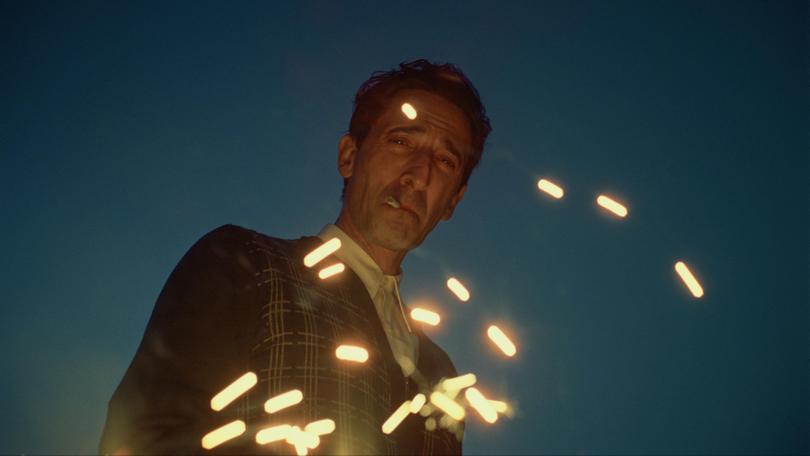The Brutalist and Emilia Perez caught in AI usage quagmire amid industry anxiety
The Brutalist’s director, Brady Corbet, had to come out in defence of his film’s use of generative AI on its lead actors’ performances. Emilia Perez has also been caught in the net.

In May, Scarlett Johansson threatened legal action against OpenAI for, she alleged, copying and mimicking her voice for its AI system.
The actor had earlier been approached by the company to licence her distinctive voice and she had refused. So, when OpenAI debuted “Sky”, she was gobsmacked.
She said at the time, “When I heard the released demo, I was shocked, angered and in disbelief that Mr Altman would pursue a voice that sounded so eerily similar to mine that my closest friends and news outlets could not tell the difference.”
Sign up to The Nightly's newsletters.
Get the first look at the digital newspaper, curated daily stories and breaking headlines delivered to your inbox.
By continuing you agree to our Terms and Privacy Policy.OpenAI dropped its use but the spectre of AI and human performances loom large.
One of the core contentions during the 2023 actors’ strike against the studios was about AI, and it was among the last issues to be resolved in the protracted negotiations. Video game performers faced the battle a year later in their own industrial action.
As well as labour and wage ramifications of having your voice and likeness replicated by technology, and not being paid for work that could’ve gone to a human, the bigger debate is the ethics of using generative AI.
Two Oscar contenders have been caught up in the quagmire this week: The Brutalist and Emilia Perez.

The Brutalist’s editor, David Jansco, gave an interview to a tech publication called Red Shark News in which he discussed deploying the technology, a tool called Respeecher, to enhance the authenticity of actors Adrien Brody and Felicity Jones’ Hungarian dialogue.
Jansco said he fed Brody and Jones’ voices as well as his own (Jansco is Hungarian) into Respeecher to produce an AI-generated Hungarian accent. The film features chunks of Hungarian dialogue in addition to English.
“Most of their Hungarian dialogue has a part of me talking in there,” he added. “We were very careful about keeping their performances, it’s mainly just replacing letters here and there. You can do this in ProTools yourself, but we had so much dialogue in Hungarian that we really needed to speed up the process otherwise we’d still be in post(-production).”
The revelation has led to director Brady Corbet overnight issuing a response. Corbet insisted that Brody and Jones’ performances are “completely their own” and detailed the actors had spent months working with a dialect coach.
He also emphasised the AI was only used for the Hungarian dialogue scenes and none of the English-language ones.
“The aim was to preserve the authenticity of Adrien and Felicity’s performances in another language, not to replace or alter them, and done with the utmost respect for the craft.”
He added, “The Brutalist is a film about human complexity, and every aspect of its creation was driven by human effort, creativity and collaboration. We are incredibly proud of our team and what they’re accomplished here.”

The imbroglio has also led to the re-emergence of an interview from May, conducted at the Cannes Film Festival, in which Emilia Perez’s re-recording mixer, Cyril Holtz, said that the production used Respeecher to extend the vocal range of lead actor Karla Sofia Gascon’s singing voice, blending it with French singer Camille, who wrote songs for the film.
The question is whether the use of AI tools such as Respeecher is less ethical or different from other forms of mixing, such as blending Rami Malek’s vocals with Freddie Mercury’s as well as Canadian singer Marc Matel for Bohemian Rhapsody.
Respeecher has also been used to clone James Earl Jones’ voice in the Star Wars series Obi-Wan Kenobi.
In that original interview, which Jansco may now regret given the stir it’s caused in the lead-up to Oscars voting, he acknowledged that AI was a controversial topic in the creative industry.
“But it shouldn’t be,” he said. “We should be having a very open discussion about what tools AI can provide us with. There’s nothing in the film using AI that hasn’t been done before. It just makes the process a lot faster. We use AI to create these tiny details that we didn’t have the money or the time to shoot.”
In response to Johansson’s legal threat last year, the American actors’ union, SAG-AFTRA said, “It is no longer science fiction to easily clone a voice, it is a science fact.”

